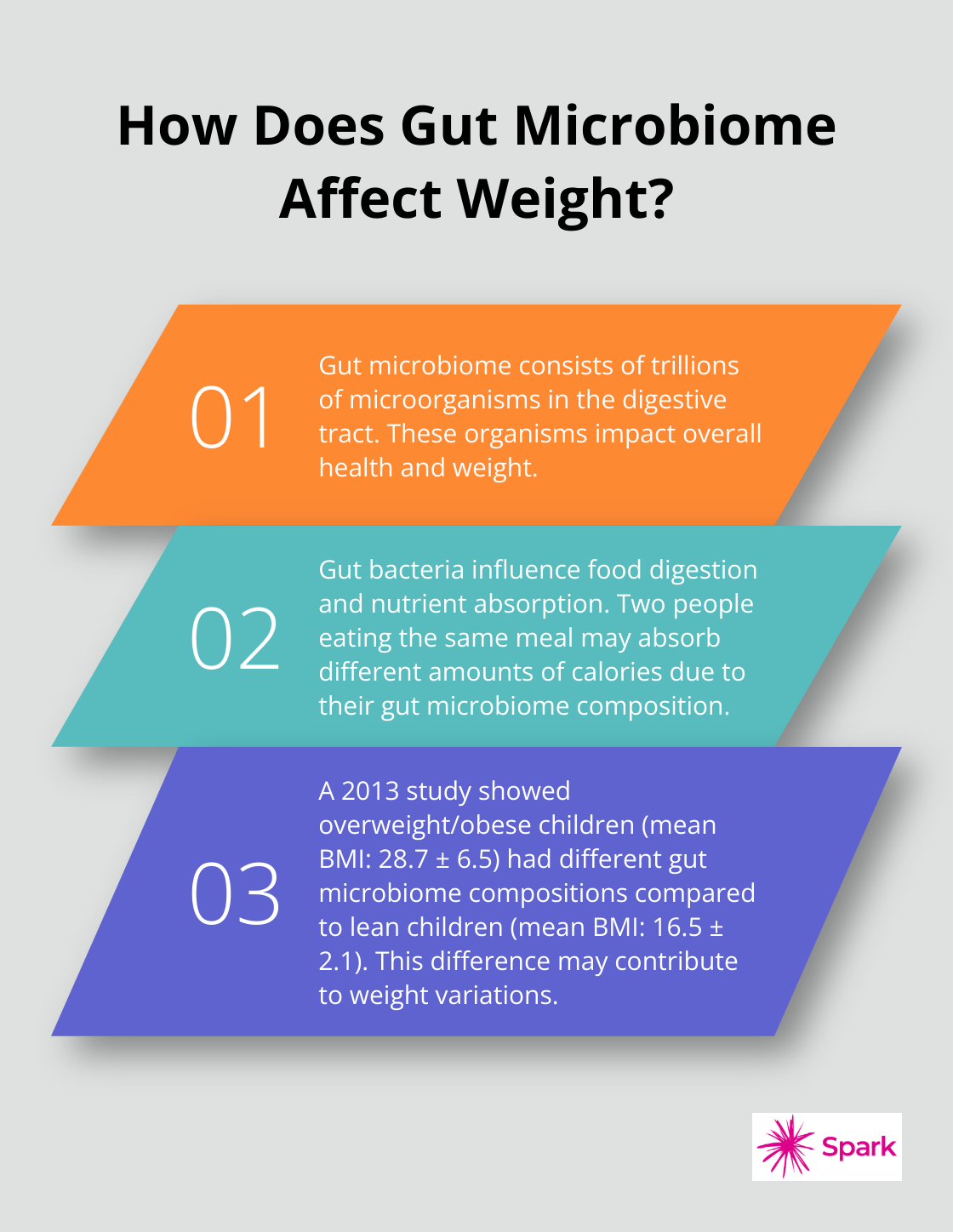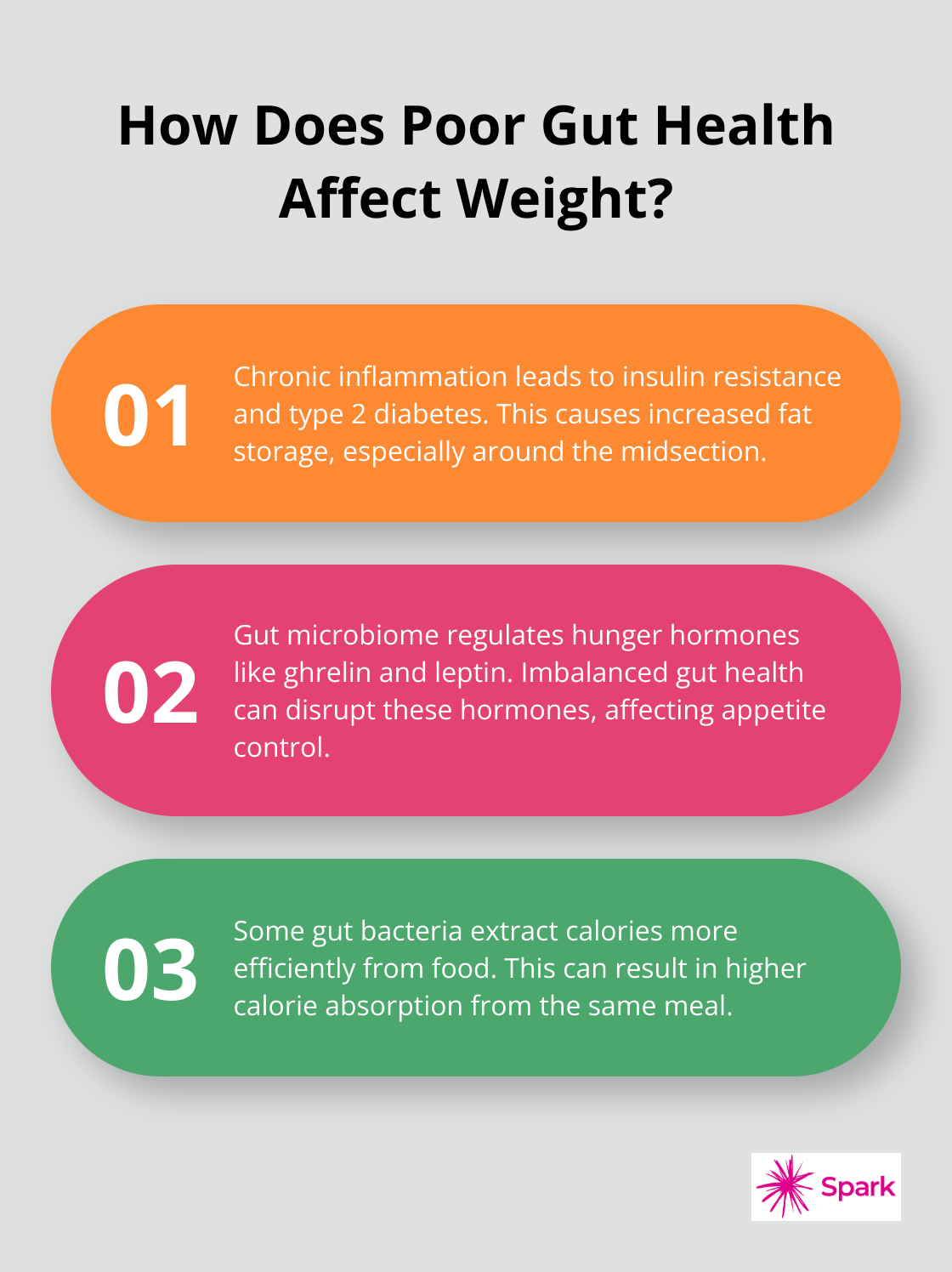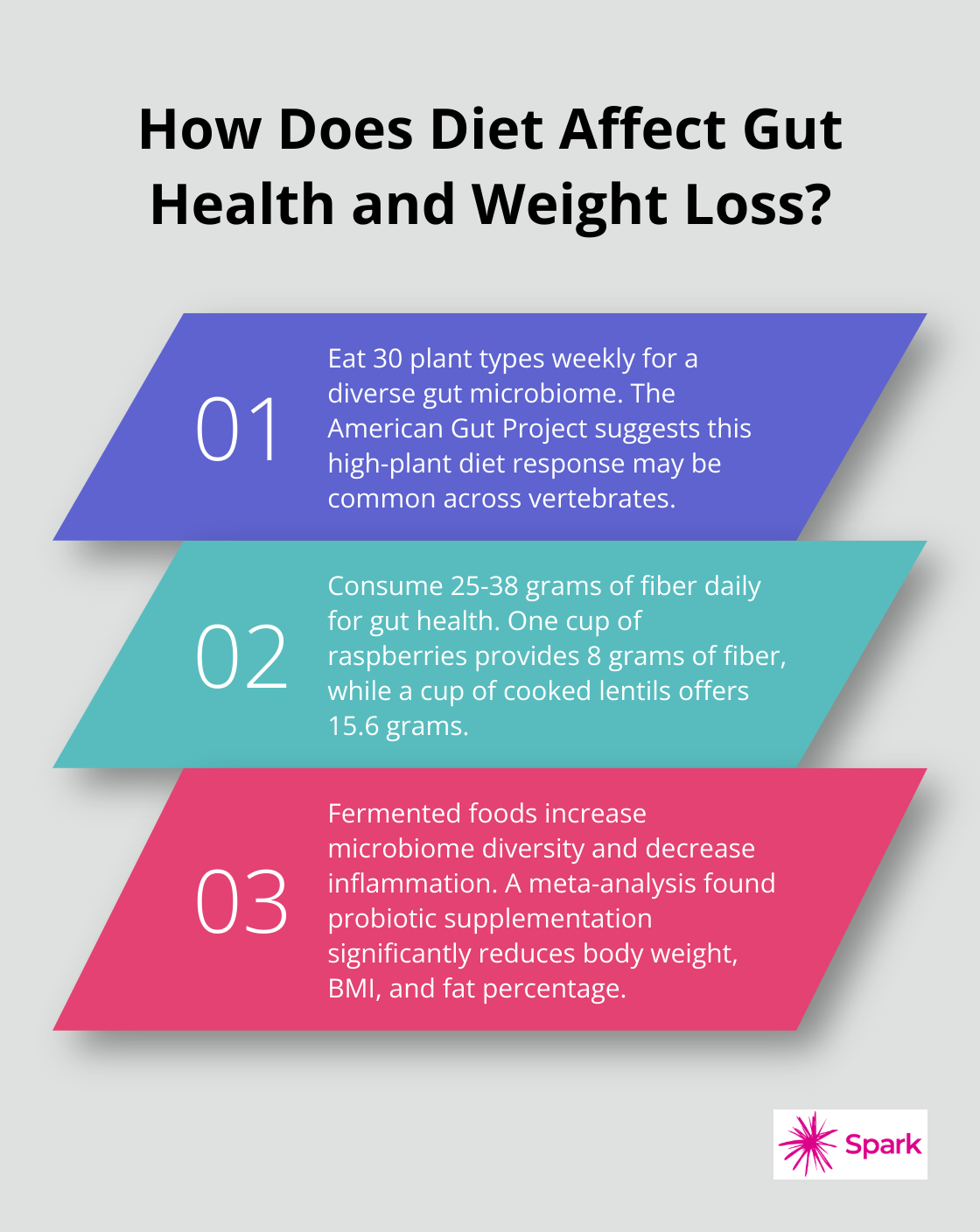At Spark Healthcare, we’re often asked: “Does gut health affect weight?” The answer is a resounding yes.
Your gut microbiome plays a crucial role in metabolism, appetite regulation, and even food cravings. Understanding this connection can be a game-changer for those struggling with weight management.
In this post, we’ll explore how your gut health impacts your weight and provide practical tips to improve your gut microbiome for better weight control.
What’s the Gut Microbiome’s Role in Weight?
The Complex Ecosystem in Your Digestive Tract
Your gut microbiome consists of trillions of microorganisms that live in your digestive tract. These tiny organisms significantly impact your overall health, including your weight.
How Gut Bacteria Affect Metabolism
The bacteria in your gut influence how you digest food and absorb nutrients. Some gut bacteria extract energy from food more efficiently than others. As a result, two people who eat the same meal might absorb different amounts of calories, depending on their gut microbiome composition.

A study published in 2013 revealed that overweight/obese children (mean BMI: 28.7 ± 6.5) had different gut microbiome compositions compared to lean children (mean BMI: 16.5 ± 2.1). This difference in gut bacteria may contribute to weight differences.
The Two-Way Relationship Between Gut Health and Obesity
Obesity can alter your gut microbiome, and an unhealthy gut microbiome can contribute to weight gain. This complex relationship highlights the importance of maintaining a healthy gut for weight management.
Research demonstrates that a diet high in fat and low in fiber can reduce the diversity of gut bacteria. This reduced diversity often appears in individuals with obesity.
Practical Steps to Enhance Your Gut Microbiome
- Eat a diverse range of foods: A varied diet promotes a diverse microbiome. Try to include 30 different plant foods each week.
- Increase fiber intake: Fiber nourishes beneficial gut bacteria. The American Heart Association suggests that eating more dietary fiber may help prevent Type 2 diabetes by promoting beneficial gut bacteria.
- Include fermented foods: Yogurt, kefir, and sauerkraut (rich in probiotics) can introduce beneficial bacteria to your gut.
- Limit artificial sweeteners: A 2014 study in Nature found that artificial sweeteners can negatively impact gut bacteria and potentially lead to glucose intolerance.
- Consider a probiotic supplement: While more research is needed, some studies suggest probiotics may help with weight management. (Always consult with a healthcare professional before starting any new supplement regimen.)
Understanding your gut microbiome provides a powerful tool for managing your weight. The steps you take to improve your gut health not only support your digestive system but also potentially influence your body’s ability to maintain a healthy weight.
As we explore the intricate relationship between gut health and weight, it becomes clear that poor gut health can lead to weight gain through various mechanisms. Let’s examine how an unhealthy gut microbiome can impact your weight in the next section.
Why Poor Gut Health Causes Weight Gain
Inflammation: The Silent Weight Gainer
Poor gut health often leads to chronic inflammation. This persistent inflammation can lead to insulin resistance, β-cell dysfunction, and ultimately type 2 diabetes. As a result, your body may store more fat, especially around your midsection.
Hunger Hormones Gone Haywire
Your gut microbiome regulates hunger hormones like ghrelin and leptin. When your gut health suffers, these hormones can become imbalanced. Gut microbial metabolites and components act as appetite-related signaling molecules to regulate appetite-related hormone secretion and the immune system.
Extracting More Calories from Food
Some gut bacteria extract calories from food more efficiently than others. If your gut microbiome contains mostly these “energy-harvesting” bacteria, you might absorb more calories than someone eating the exact same meal.

A groundbreaking study (published in Nature in 2006) demonstrated that transferring gut bacteria from obese mice to lean mice caused the lean mice to gain weight, even without changing their diet. This suggests that the composition of your gut microbiome can significantly impact how many calories you absorb from your food.
Cravings for Unhealthy Foods
An imbalanced gut microbiome can influence your food preferences and cravings, often leading to a desire for less healthy options (particularly those high in sugar and fat).
A study in BioEssays in 2014 proposed that gut bacteria can manipulate your eating behavior to favor foods that they thrive on, which are often not the healthiest choices for you. Improving your gut health may make it easier to resist unhealthy food cravings and make better dietary choices.
These issues underscore the importance of maintaining a healthy gut for effective weight management. In the next section, we’ll explore practical strategies to enhance your gut health and support your weight loss goals.
How to Improve Gut Health for Weight Loss
Diversify Your Diet with Fiber-Rich Foods
A varied diet promotes a diverse gut microbiome. Try to eat 30 plant types every week. This includes fruits, vegetables, whole grains, nuts, and seeds. Fiber plays a key role in gut health. The American Gut Project found that studies suggest these types of responses in the gut microbiome to a high-plant diet may be common across vertebrates.

Increase your fiber intake gradually to avoid digestive discomfort. The Institute of Medicine recommends 25 grams per day for women and 38 grams for men. Good sources include:
- Berries (1 cup of raspberries contains 8 grams of fiber)
- Beans (1 cup of cooked lentils provides 15.6 grams)
- Whole grains (1 cup of cooked quinoa offers 5.2 grams)
Incorporate Fermented Foods and Probiotics
Fermented foods introduce beneficial bacteria to your gut. A study in the journal Cell found that a diet high in fermented foods increased microbiome diversity and decreased markers of inflammation. Include foods like:
- Yogurt (look for varieties with live active cultures)
- Kefir
- Kimchi
- Sauerkraut
- Kombucha
Probiotic supplements can also benefit gut health. A meta-analysis published in Nutrients found that probiotic supplementation led to significant reductions in body weight, BMI, and fat percentage. (Always consult with a healthcare professional before starting any new supplement regimen.)
Reduce Stress and Prioritize Sleep
Chronic stress can negatively impact your gut health and contribute to weight gain. Implement stress-reduction techniques such as:
- Meditation (even 10 minutes daily can make a difference)
- Deep breathing exercises
- Regular physical activity
- Time in nature
Quality sleep is equally important. A study in the journal PLOS ONE found that just two nights of partial sleep deprivation caused changes in the gut microbiome associated with decreased insulin sensitivity and increased food intake. Try to get 7-9 hours of sleep per night.
Exercise Regularly
Physical activity benefits your gut health in multiple ways. A review in Exercise and Sport Sciences Reviews reported that exercise can increase the diversity of gut bacteria and enhance the production of short-chain fatty acids (beneficial for gut health).
Try to engage in at least 150 minutes of moderate-intensity aerobic activity or 75 minutes of vigorous-intensity aerobic activity per week, as recommended by the World Health Organization.
Limit Antibiotic Use
While antibiotics are sometimes necessary, overuse can harm your gut microbiome. A study in Nature found that even a single course of antibiotics can alter the composition of the gut microbiome for up to a year.
Only take antibiotics when prescribed by a healthcare professional, and consider taking probiotics during and after antibiotic treatment to help restore beneficial bacteria.
Final Thoughts
The connection between gut health and weight management is clear. Your gut microbiome influences metabolism, appetite regulation, and food cravings. The question “Does gut health affect weight?” receives a definitive yes answer. A healthy gut microbiome supports not only your digestive system but also your body’s ability to maintain a healthy weight.

Improving gut health involves simple yet effective steps. You can diversify your diet with fiber-rich foods, add fermented foods and probiotics, manage stress, prioritize sleep, exercise regularly, and use antibiotics wisely. These actions offer benefits beyond weight management, including improved immune function, better mental health, and reduced risk of chronic diseases.
At Spark Healthcare, we recognize the link between physical and mental well-being. Our personalized telepsychiatry services support your journey towards better health. Improving your gut health takes time, but you may find that your weight becomes easier to manage and you feel better overall.






